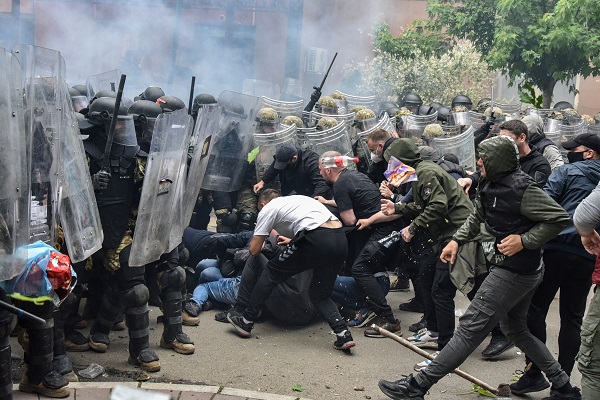 NATO Kosovo Force (KFOR) soldiers clash with local Kosovo Serb protesters at the entrance of the municipality office, in the town of Zvecan, Kosovo, 29 May 2023;
Credit: Reuters/Laura Hasani
NATO Kosovo Force (KFOR) soldiers clash with local Kosovo Serb protesters at the entrance of the municipality office, in the town of Zvecan, Kosovo, 29 May 2023;
Credit: Reuters/Laura Hasani
ZVECAN, Kosovo (Reuters) - NATO is to send 700 extra troops to Kosovo and put another battalion on high alert to go in as unrest in the region has intensified since ethnic Albanian mayors took office in the country's northern Serb-majority area after votes last month.
In the town of Zvecan on Tuesday 30 May 2023, dozens of NATO soldiers in anti-riot gear from the United States, Poland and Italy secured a municipal building as Serbs against protested against the Albanian mayor.
The Serbian protesters dispersed around 16:00 and will return on the morning of Wednesday 31 May 2023, the Serbian Tanjug news agency reported, citing Serbian officials in Zvecan.
Some 30 NATO peacekeeping soldiers defending three town halls in northern Kosovo were injured in clashes with Serb protesters on Monday 29 May 2023. 52 protesters were wounded.
NATO already has some 4,000 soldiers currently in Kosovo and Secretary General Jens Stoltenberg said the decision had been made to send more. "We have decided to deploy 700 more troops from the operational reserve force for western Balkans and to put an additional battalion of reserve forces on high alertness so they can also be deployed if needed," he told reporters in Oslo.
A Reuters reporter saw four big NATO convoys heading to the north late on Tuesday afternoon.
The United States and allies have rebuked Kosovo for escalating tensions with Serbia, saying the use of force to install mayors in ethnic Serb areas undermined efforts to improve troubled relations with neighbouring Serbia.
Serbian President Aleksandar Vucic has placed the army on full combat alert and ordered units to move closer to the border.
Serbs refused to take part in the local elections in April 2023 and ethnic Albanian candidates won the mayoralties in four Serb-majority municipalities with a 3.5% turnout.
Northern Kosovo's majority Serbs have never accepted Kosovo's 2008 declaration of independence from Serbia and consider Belgrade their capital more than two decades after the Kosovo Albanian uprising against repressive Serbian rule.
Ethnic Albanians make up more than 90% of the population in Kosovo as a whole, but northern Serbs have long demanded the implementation of an EU-brokered 2013 deal for the creation of an association of autonomous municipalities in their area.
Masked men in the town of Leposavic close to the Serbian border smashed the windshield of a car with an Albanian licence plate marked as "A2, CNN affiliate," a Reuters reporter who witnessed the incident said. A separate car belonging to another media outlet was smashed as well. No one was injured.
De-escalation urged
Washington, the most outspoken advocate and supporter of Kosovo independence, decided to cancel Kosovo's participation in a military drill after Pristina refused to withdraw the mayors and its police forces from the north. "We're thinking through other implications as well," the US ambassador to Kosovo Jeffrey Hovenier told reporters.
EU foreign policy chief Josep Borrell urged Kosovo and Serbian leaders to find a way to de-escalate tensions. "We have too much violence already in Europe today, we cannot afford another conflict," Borrell said in Brussels.
Russia, which has long had close ties with Serbia and shares its Slavic and Orthodox Christian traditions, called on Tuesday for "decisive steps" to quell the unrest. The foreign ministry urged "the West to finally silence its false propaganda and stop blaming incidents in Kosovo on Serbs".
Kosovo authorities have blamed Serbian President Aleksandar Vucic for destabilising Kosovo. Vucic blames Kosovo authorities for causing problems by installing new mayors.
After meeting ambassadors of the Quint group - comprising the United States, Italy, France, Germany and the United Kingdom - in Belgrade, Vucic said he had asked that Albanian mayors be removed from their offices in the north.
Kosovo President Vjosa Osmani said criminal gangs, supported by Vucic, aimed to destabilise Kosovo and the entire region.








